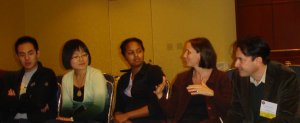This post was written as a supplement to Conference Attendance Advice by Erin Dorney. Erin’s post covers a lot of ground, but I have a few more additions based on my own conference experiences both locally, and at ALA MidWinter. I suggested an addition in the comments section of Erin’s post, and I’ll start with that.
- Invited Parties and Receptions: Try and attend all of the receptions/parties you are personally invited to, and if you can fit them in, try and attend some of the open invitation receptions/parties. The ones you are invited to are usually based on your membership in a group and will provide great semi-relaxed places to get to know others with similar interests. The open receptions are more intimidating, but the people are just as interesting to get to know. Of course you should keep in mind Erin’s #6 and pace yourself.
- Talk & Panel Etiquette: If you are attending a talk or panel session you are probably very interested in the topic, so is everyone else in the room. If you are uncomfortable sitting for long periods of time take a seat at the back or sides of the room so that you won’t disturb others when you need to stand. Limit yourself to 2 questions per session, 3 absolute maximum in extenuating circumstances. The speakers are there for everyone and it is not only rude to dominate the entire presentation, it makes it difficult for the speaker to present all of their material if they are being constantly interrupted. If you have a lot of questions think about walking up to the speaker after the session is over, unless they are in a hurry most speakers enjoy speaking with enthusiastic listeners. Again, be courteous, if you have a lot to talk about but there are other people waiting for the speaker exchange information and contact them at a later time.
- Expo Goodies: If you like to read don’t bother bringing any books with you. There are free and discounted books ($3-$5 paperback, $5-$15 hardback) in every genre. Think about under packing on your way to a conference if you are a bibliophile, that way you won’t be over your weight limits on your way home. There are plenty of reusable bags being given away if you want to save some space in your luggage. The most giveaways are at opening and closing.
- Take Care of Yourself: Erin touches on this in her #6 Make a Schedule, but I’d like to emphasize the importance of taking care of yourself at these events. Drink lots of water, if water is provided and your table runs out don’t be shy about flagging down a waiter or grabbing some off of a deserted table. Wear layers, hotels often have the heat set high in the winter, and the AC set for freezing in the summer. A thin jacket or sweater that easily fits in your bag is ideal for personal temperature management. If you are wiped out take a break and have a nap. The only things you absolutely have to attend are your own committee meetings, and paid workshops, everything else is negotiable.
- Add People You’ve Met to Your Personal Network: It is best to do this as soon as possible after meeting them. I spent the morning I left adding the majority of the people I met. Not all the people you will connect with will currently be librarians. Several vendors and recruiters are former librarians and you’ll be surprised how easy it is to connect with them.
- Be Generous With Job Leads: In this trying time a lot of librarians and library school students are searching for jobs. If you speak with someone who is looking, and you know of a job that is a good fit, tell him or her, even if you are applying too. You may be scratching your head at this point thinking, why would I give away a job lead? This seems counter intuitive but ask yourself these questions: Do you want to work for someone knowing that they settled for you instead of choosing you because you were exactly what they wanted? If you are chosen because the hiring manager is settling how will your co-workers view you? The best reason to pass on a job lead is because it feels good to help others.
I hope these tips, combined with Erin’s, help you have a fun and meaningful conference experience. See you at ALA Annual!


